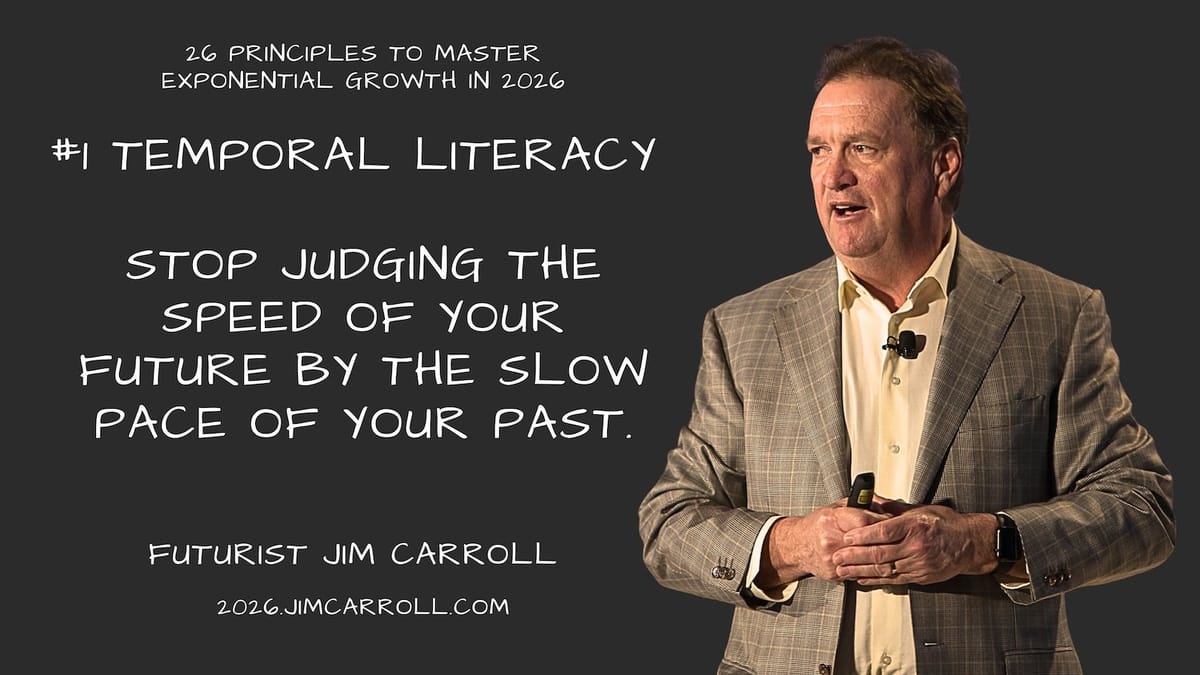"Stop judging the speed of your future by the slow pace of your past." - Futurist Jim Carroll
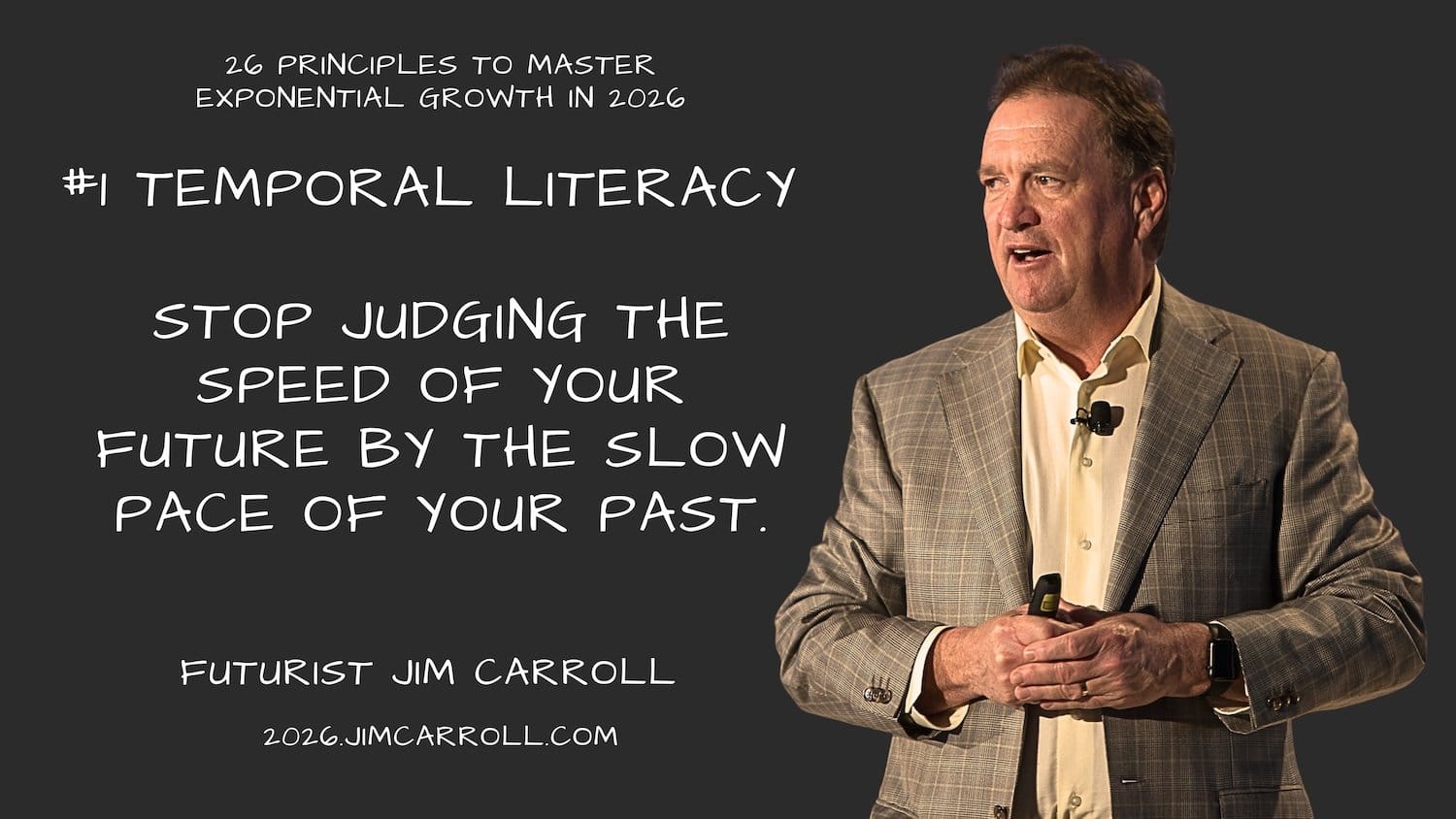
It's Day 1 of your new path for 2026! 26 days, 26 principles to get you into the exponential mindset.
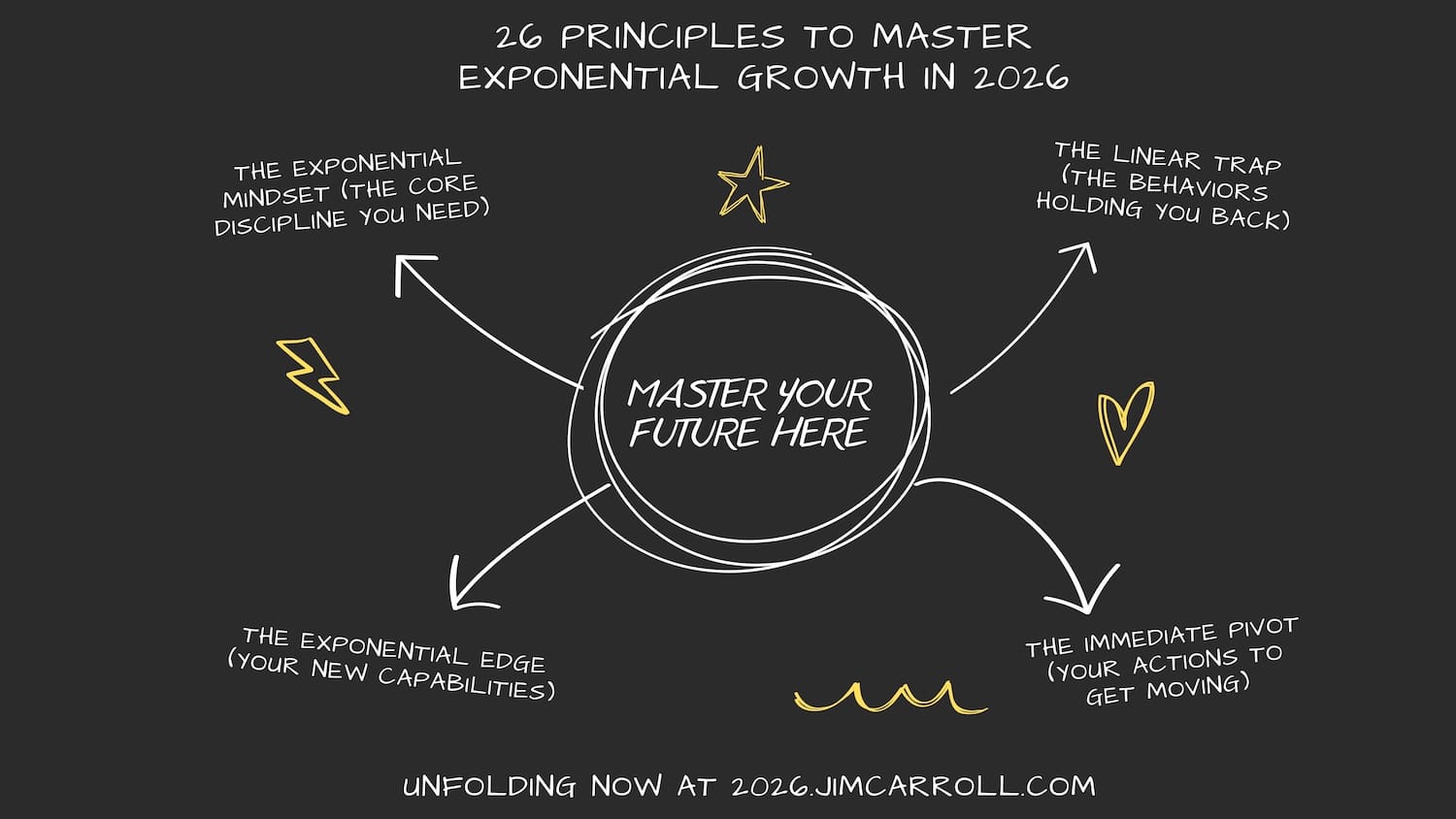
Step 1? Master "Temporal Literacy" - in which you stop judging the speed of your future by the slow pace of your past!
The single biggest mistake you can make right now is to believe that you can just keep doing the same old things at the same old deliberate pace that worked for you yesterday.
You can't.
Think about it - your past career success, your accumulated knowledge, and your daily routine have all been built on a 'linear' world - one that involves a slow, steady and expected rate of change. That's gone. The world is accelerating exponentially, creating a massive Temporal Lag between the speed you move and the speed the world demands.
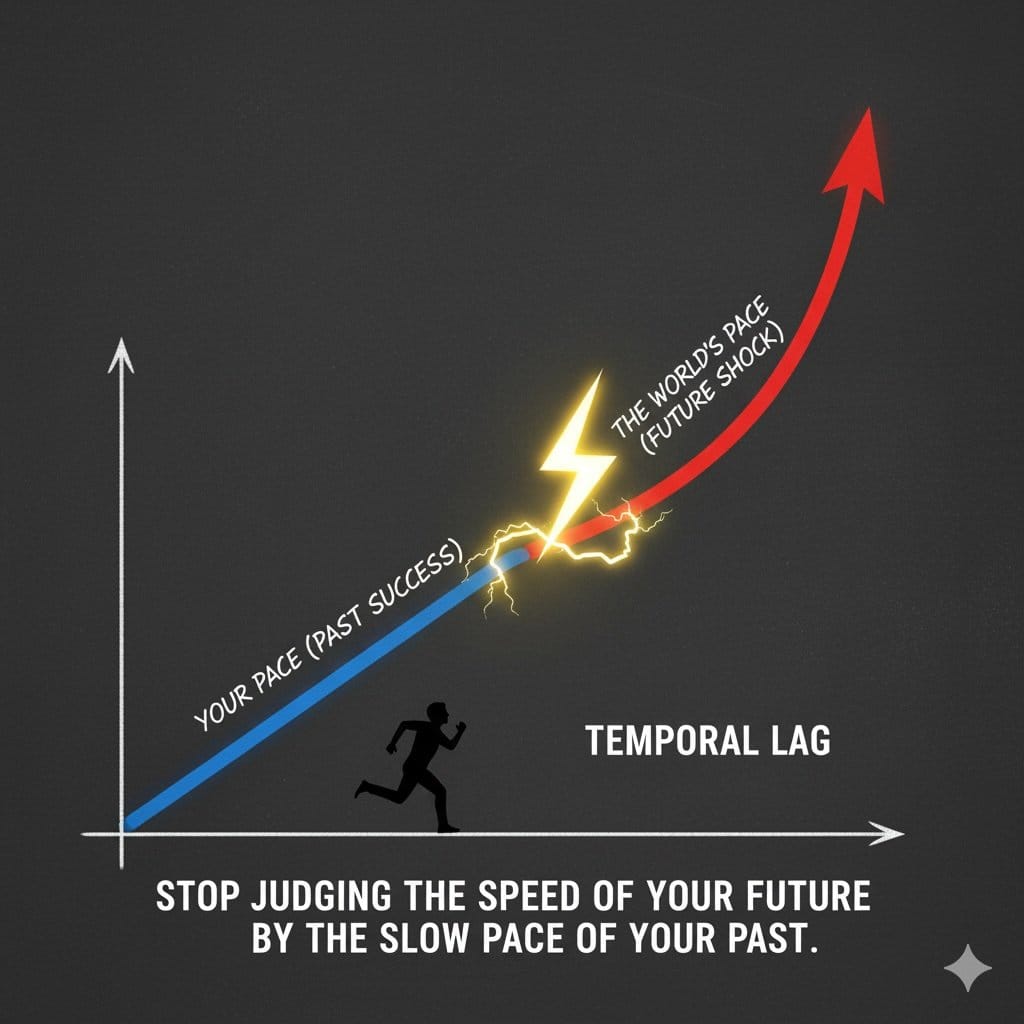
Alvin Toffler called it "Future Shock." You are in the middle of that right now.
Here's what you need to do
1. Get Into The Exponential Mindset - And The Idea of Temporal Literacy
This is the personal discipline of intentionally shifting your focus from the urgent, day-to-day demands of the immediate present (everything involves this moment and a 90-day execution) to the strategic planning required to align with the inevitable future (5- to 50-year vision).
Stop living every moment for the short-term: start thinking more about what matters for the long term.
It is the realisation that the future is accelerating far faster than your experience suggests, and it's deciding to change yourself to close the gap.
In essence, it's deciding to do this!
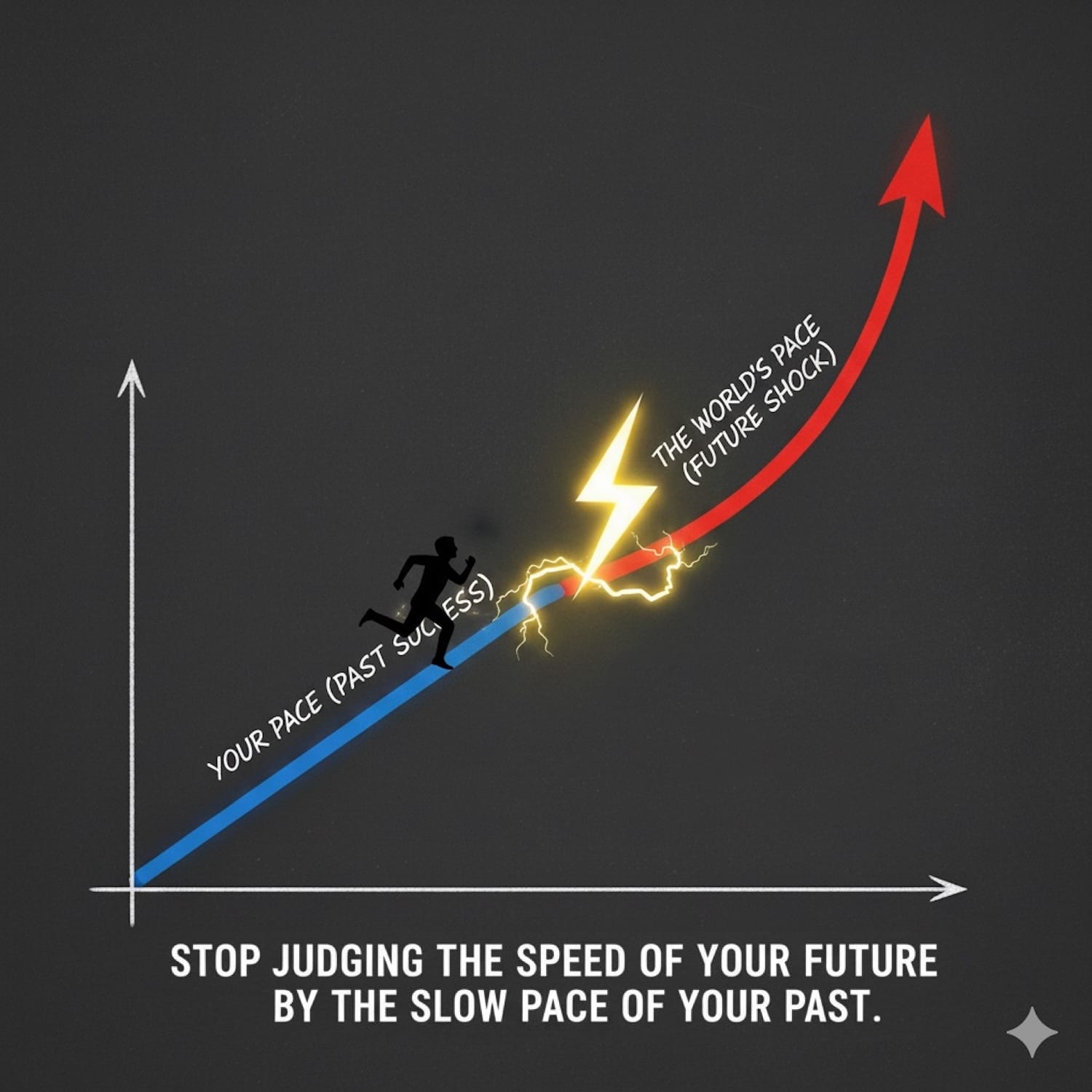
2. The Linear Trap
How do you do that? that?
By examining what mindset you currently have that binds you to linear thinking in an exponential world!!
Ask yourself if you are guilty of any of these things. (I bet you are!) Answering yes to any of them means that you are letting a temporal lag define your future, because the speed of change is outstripping your ability to act. These are like the innovation killers I often share, but at a personal level.

- Waiting for clarity that never comes: assuming you must reach 90% certainty before acting, delaying movement while exponential trends speed past you.
- Clinging to past measures of success: measuring your current value using the linear standards of the last decade (e.g., years of experience), instead of future readiness.
- The "Slow down, I'll catch up" expectation: assuming a trend (like AI) will slow down or pause its development to give you time to catch up, disregarding the exponential growth curve.
- Prioritizing your routines: allocating 90% of your time to tasks that leverage comforting, old skills while neglecting the new, challenging skills that will define your career in five years.
- Aggressive indecision: postponing a difficult strategic choice (e.g., career pivot) due to the fear of making the wrong choice, where the inaction is actually the most definitive, negative decision.
- Budgeting by increments, not outcomes: structuring your personal development with a linear 5% increase from last year’s efforts, preventing the non-linear investment required for an exponential jump.
- Clinging to familiarity: surrounding yourself with those who reinforce your existing knowledge, creating a temporal echo chamber.
- Solving a new problem with an old tool: failing to update your fundamental toolkit (software, methodology, or thought process) to match the problem's current complexity.
- Mistaking motion for progress: confusing the sheer linear volume of activity (long hours, full calendar) with actual exponential progress (high-impact outcomes, strategic breakthroughs).
- The fear-driven focus: allowing external fear to dictate your learning agenda rather than proactively selecting skills based on future opportunity.
Do an honest self-assessment.
Are you stuck?
3. The Exponential Edge
To close the loop, you must replace those old, linear habits with a new set of new, exponential ones. This is what you'll get by going there: you'll gain the ability to:
- Aligning to the inevitable: Stop waiting for clarity or perfection and instead master the skill of moving first with speed and agility. You don't try to predict the future; you proactively align with the trends you know are accelerating.
- Think long term, act short term: Develop the capacity to hold a clear 5-year vision in your mind while executing rapid, high-impact daily actions. You use the long-term view to filter and prioritise what matters most right now. Stop doing the things that don't matter!
- Practice "strategic obsolescence": Your skills and knowledge are going out of date faster than you know. Gain the courage to intentionally shed past successful skills, assumptions, and commitments before the future forces you to. You become the architect of your own career, constantly getting rid of the old to make room for the exponential new.
- Get better at 'foresight': Move beyond vague feelings about the future and better insight into what comes next. Become your own futurist! That will help you turn the abstract challenge of accelerated change into a tangible, measurable goal for personal growth.
- Start to operate on "exponential time": Stop being surprised when a major change happens fast. Get ready for it before it hits you!
That's how exponential thinkers think. Become one!
4. The Immediate Pivot
So what should you do right now? Decide that your journey to exponential growth begins with the next 15 minutes.

Here are the immediate actions you must take right now to stop the temporal lag:
- Embrace "decision velocity": adopt the rule of 70% certainty and 100% agility. Make decisions faster, assuming you will learn and correct rapidly.
- Redefine your success metrics: shift from measuring past achievements to tracking future readiness."
- Start to do your own 'trends analysis' as part of your routine: dedicate regular, protected time (e.g., 2 hours every Friday) to actively research and experiment with emerging tools and concepts outside your immediate job description.
- Practice "strategic inaction": actively identify and eliminate low-value, linear tasks that consume your time but don't contribute to exponential growth. Ask yourself - do I really need to do this?
- Build your "future peer network": actively seek out mentors and communities who operate at the leading edge of your field to challenge your linear biases. Join that LinkedIn group. Get involved in that future-oriented committee in your association. Heck, reach out to me!
- Invest in new tools: continuously evaluate if you are using tools that deliver linear improvements when an exponential tool could deliver significantly greater impact, particularly so with AI.
- Cultivate a "learner's mindset": approach every new challenge, every setback, and every unfamiliar technology with genuine curiosity, not fear. Master just-in-time knowledge
- Embrace "deliberate discomfort": intentionally seek out situations or learning experiences that push you beyond your current capabilities and comfort zone.
Everything above isn't just a list of cool bullet points - these are the things you should start thinking about to get into a temporal shift. You are learning to speed up by examining what's slowing you down.
Take the list, print it out, stick it on your desk, and reflect on it regularly. Challenge yourself to think faster, act faster.
Every day, pretend you're in London - Mind the Gap - and close it by jumping on it.
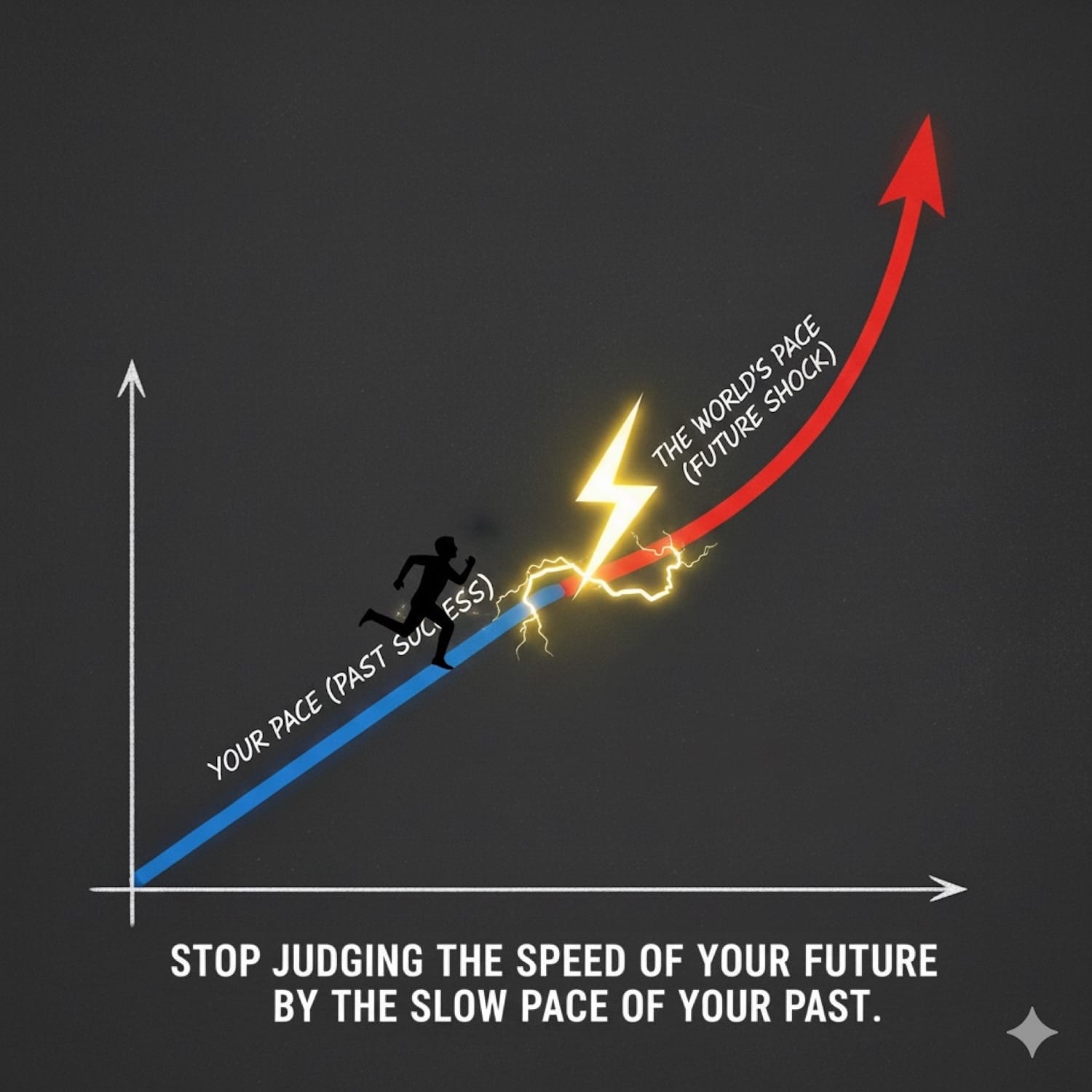
Tomorrow? Principle #2 - New Skills Acquisition! And we'll keep using the same framework - the key concept or principle, an honest self-assessment, your strategic solution, the immediate actions you need to take!
Futurist Jim Carroll is writing a series, 26 Principles to Master Exponential Growth in 2026. You can follow the series here: 2026.jimcarroll.com

